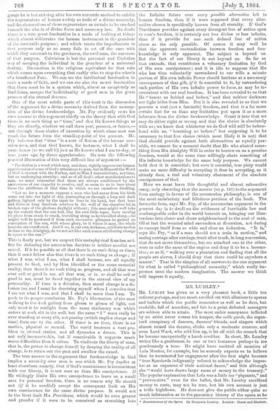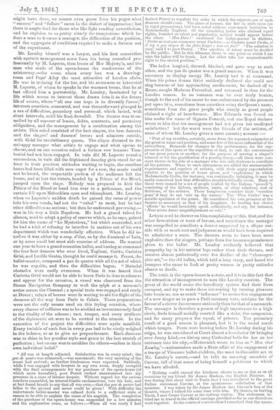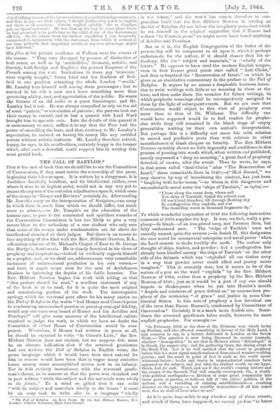MR. LU MLEY.* Mn. LUMLEY has given us a very
pleasant book, a little too reticent perhaps, and too much swelled out with allusions to operas and ballets which the public remember as well as he does, but readable, full of anecdote, and fair to a point defeated managers are seldom able to attain. The most unfair annoyance inflicted by an artist never rouses his temper, the veille garde, the organ- ized conspiracy of dancers, dancers' friends, and singers which almost ruined the theatre, elicits only a moderate censure, and even Lord Ward, who sold him up, is let off with the remark that he became unexpectedly a harsh creditor. In short, Mr. Lumley writes like a gentleman, in one or two instances perhaps in too gentlemanly a tone. He might have omitted all mention of Lola Monte; for example, but he scarcely expects us to believe that he terminated her engagement after the first night because "true Spaniards indignantly refused to acknowledge the impos- tor as an exponent of their national dance," and this although she "would have drawn large sums of money to the treasury." The popular explanation that Lola was a little too "piquante," and " provocative " even for the ballet, that Mr. Lumley sacrificed money to caste, may not be true, but his own account is just a trifle higbflown. He does not give the public either quite so much information as to the pecuniary history of the opera as he
* Reminiscences of the Opera. By Benjamla Lumley. London: Hunt and. Blaakett.
might have done, we cannot even guess from his pages what "success" and " failure " mean in the dialect of impresarios ; but there is ample fool for those who like light reading nevertheless, and he explains to us pretty clearly the temptations ■Vhich in- duce a man to ly•corne a manager, the difficulties of the position, and the aggregate of conditions required to make a fortune out of the experiment.
Mr. Lumley himself was a lawyer, and his first connection with operatic management arose from his being consulted pro- fessionally by M. Laporte, then lessee of Her Majesty's, and the man who made of the opera-house the rendezvous of the aristocracy,—the scene where every box was a drawing- room and Fops' Alley the most attractive of London clubs. He was in training for the bar, and his acuteness so interested
M. Laporte, of whom he speaks in the warmest terms, that he at last offered him a partnership. Mr. Lumley, fascinated by a life which seems to interest those drawn into it as the dreary life of courts, where "all one can hops is to diversify l'ennui," interests courtiers, consented; and was thenceforward plunged in a sea of difficulties, pecuniary and personal, which lasted, with short intervals, until his final, downfall. The theatre was tram- melled by all manner of leases, debts, contracts, and pecuniary
obligations, and the management by a combination among the artists. This cabal consisted of the best singers, the best dancers, and the singers' and dancers' lovers and admirers outside, with Grisi for revolutionary queen. The clique dictated to the unhappy manager what artists to engage and what operas to choose, and on one occasion raised a furious row because Tam- burini had not been engaged. In vain did M. Laporte promise concessions, in vain did the frightened dancing girls stand for an hour in their prettiest attitudes waiting to begin, the omnibus boxes had been filled with men eager for a row, the music could not be heard, the respectable portion of the audience left the house, and at last the rioters, headed by a Prince of the Blood, jumped upon the stage. Nobody was prepared to kick the Prince of the Blood or hand him over to a policeman, and the curtain fell Ivan Mohockistn open and triumphant. Mr. Lumley, when on Laporte's sudden death he gained the reins of power into his own hands, had net the "cabal" to meet, but he had other difficulties as serious ; but then he understood governing,— was in his way a little Napoleon. He had a grand talent for silence, used to adopt a policy of reserve which, as he says, gained for him the name of "Le Mysterieux," but which succeeded, and he had a trick of refusing to interfere in matters out of his own
department which was wonderfully effective. When he did in- terfere it was either by a coup d'etat, as by the dismissal of Lola, or by some small but most able exercise of address. He wanted one year to have a grand sensation ballet, and having at command the four best dancers who ever lived, Taglioni, Cerito, Carlotta
Grisi, and Lucille Grahn, thought he could manage it. Perrot, the ballet-master, composed a pas de quatre with all the art of which he was capable, and then the difficulties began. "Material obstacks were easily overcome. When it was feared that
Carlotta Grisi would not be able to leave Paris in time to rehearse and appear for the occasion, a vessel was chartered from the Steam Navigation Company to waft the sylph at a moment's notice across the Channel ; a special train was engaged and ready at Dover ; relays of horses were in waiting to aid the flight of the danseuse all the way from Paris to Calais. These preparations
were not the only means used on this trying occasion, where every chanee of collision was to be avoided as instantaneously fatal to the vitality of the scheme ; tact, temper, and every attribute
of the diplomatic art were to be exerted to the utmost. In the execution of the project the difficulties were again manifold. Every twinkle of each foot in every pas had to be nicely weighed in the balance, so as to give no preponderance. Each danseuse was to shine in her peculiar style and grace to the last stretch of perfection ; but no one was to outshine the others—unless in their own individual belief."
"All was at length adjusted. Satisfaction was in every mind ; the pas de quatre was rehearsed,—was announced; the very morning of the event had arrived ; no further hindrances were expected. Suddenly, while I was engaged with lawyers in my own room, deeply occupied with the final arrangements for my purchase of the opera-house (of which more hereafter), poor Perrot rushed unannounced into my presence in a state of intense despair. Without regard for the serious conclave assembled, he uttered frantic exclamations, tore hia hair, and at last found breath to say that all was over,—that the pas de quatre had fallen to the ground and never could be given ! With difficulty the unfortunate ballet-master was calmed down to a sufficient state of reason to be able to explain the cause of his anguish. The completion of the purchase of the opera-house was suspended for a few minutes and the explanation came, as follows :—When all was ready I had desired Perrot to regulate the order in which the separate pas of each danseuse should come, The place of honour, the last in such cases (as in regal processions), bad been ceded without over-much hesitation to Mademoiselle Taglioni. Of the remaining ladies who claimed equal rights, founded on talent and popularity, neither would appear before the other. 'Mon Die u ! ' exclaimed the ballet-master in distress, Cerito tie vest pas commencer avant Carlotta.—ni Carlotta avant Cerito, et ii n'y a pas moyen de les faire bower; tout est fini!" The solution is easy,' said I to poor Perrot. The question of talent must be decided by the public. But in this dilemma there is one point on which I am sure the ladies will be frank. Let the oldest take her unquestionable right to the envied position."
The ladies laughed, tittered, blushed, and gave way to each other, and the pas de quatre was a grand success. When it was necessary to display energy Mr.. Lumley had it at command. When his prima donna Grisi suddenly declared she could not sing because of her approaching confinement, he dashed off to Rome, caught Madame Frezzoliui, and returned in time for the London season. In no instance was he ever fairly beaten, though to the end of his career be was embarrassed by the pressure put upon birrt, sometimes from courtiers using the Queen's name, sometimes from the great people who simply as great people claimed a right of interference. Miss Edwards was forced on him under the name of Signora Favanti, and one Royal duchess wrote to him that his management had not given her unalloyed satisfaction ! but the worst were the friends of the artistes, of some of whom Mr. Lumley gives a most amusing account :—
"Part of my troubles, certainly, arose from the repeated exigencies of the great in name and position, and some few of the more influential of the subscribers. Demands for changes in the performance, for the sup- pression of this opera or the repetition of that, to suit the convenience of one great person or another, for the purpose of serving a singer's interest or for the gratification of a passing fancy,—all these were con- stant thorns in the side of a manager who was only desirous to conciliate all his patrons. When to such annoyances are added the unreasonable requirements and caprices of artistes, with their angry expostulation relative to the position of boxes given, and explosions,' in which Mademoiselle Cerito, for instance, was continually indulging, it may be easily conceived how that difficulties should habitually occur. Many of these were caused by a set of people (called by the Italians procoli '), consisting of the fathers, mothers, aunts, or other relatives, real or fictitious, of the artistes. These hangers-on consider their vocation gone' if they do not stir up the waters.' The 'Pere Canto' was a notable specimen of the genus. He considered his own presence at the theatre as necessary as that of his daughter. In lauding her choice 'effects' he would invariably speak collectively, and say, for instance, 'Noes avons clause magnifiquement ce soir."
Letters used to shower on him complaining of this, that, and the other favouritism or want of favour, and sometimes the manager was compelled to conciliate a dancer supported by a clique out- side with as much tact and judgment as would have been required to administer a state. The dancers seem to have been more explosive than the singers, perhaps from the immense prominence given to the ballet. Mr. Lumley evidently believed that prosperity lay in his artistes' legs rather than their throats, and mourns almost pathetically over the decline of the " choreogra- phic art,"— the old ballet, which told a long story, and bored the loungers who came to look at pretty women in pretty attitudes almost to death.
The truth is the opera-house is a state, and it is in this fact that the attraction of management to men like Lumley consists. The great of the world under the hereditary system find their lives ennuyant, and try to make them interesting by turning pleasure into business, use as much "influence" to secure the engagement of a new singer as to pass a Parliamentary vote, intrigue for the favour of a clever dancer more anxiously than for that of a monarch. The manager is therefore a person of high importance to a high circle, finds himself socially courted like a duke, the companion, and for many purposes the equal, of princes. The pecuniary result of a good season is pleasant, but it is the social result which tempts. Peers were bowing before Mr. Lumley during his reign, be was considered at Court almost a benefactor far bringing over Jenny Lind,—a bishop rang Cathedral bells for her on her entrance into his city,—Metternich wrote to him as " Mon cher Lumley,"—ambassadors made a State affair of the engagement of a troupe of Viennese ballet-children, the most indfeensible act in Mr. Lumley's career,—and he tells an amusing anecdote of Cavour, full of that sense of being himself a politician to which we have alluded.
"Nothing could exceed the kindness shown to me on this as on all occasions by my friend Sir James Hudson, the English Minister. It was during this short visit to Turin that I was introduced to the great Italian statesman Cavour, at the spontaneous solicitation of that minister. I was taken by Sir James Hudson into Caroni.% box at the theatre, where I talked for some time with him. By chance, on leaving Turin, I met Count Cavour at the railway station. The statesman in- vited me to travel in the official carriage provided as far as our directions went together. In the course of conversation I remarked that the neces. sity of talking was one of the inconveniences of constitutional governments, and that, in my own little sphere, I should dislike very much to explain any views on all occasions. Cavour replied quickly, On ne s'explique pas, on rtpond seulement.' He was then on his way to some place where he had promised to be godfather to the child of one of the Government officials. On his return from his further expedition I was frequently summoned to conferences with the statesman, from which it seemed at one time probable that important results to my own advantage might have followed."
His faes at his private residence at Fulham were the events of the season. "They were thronged by persons of distinction of both sexes, as well as by notabilities,' dramatic, artistic, and literary, both foreign and English ; the present Emperor of the French among the r..st. Invitations to these gay 'reunions' were eagerly sought," Jenny Lind and the Duchess of Bed- ford in one pavilion attracting the whole London "world."
Mr. Lumley bore himself well among these personages ; but to succeed in his role a man muit have something more than governing ability, tact, and appreciation of the public. He wants the fortune of an old noble or a great linendraper, and Mr. Lumley had it not. He was always compelled to rely on the aid of some "patron," or association of patrons ; the patrons took out their money in control, and at last a quarrel with Lord Ward brought him to operatic ruin. Into the details of this quarrel it ie unnecessary to enter, suffice it to say that the Peer had the power of cancelling the lease, and that, contrary to Mr. Lumley'e expectation, he insisted on having his money like any untitled person without artistic instincts. Mr. Lumley therefore retired, happy, he says, in his recollections, certainly happy in the temper which, after such a downfall, could support him in writing this most genial book.
































 Previous page
Previous page